IB Diploma Programme
Academic entry requirements
-
In order to be accepted onto the IBDP programme, Park Lane International school students are expected to have achieved A* to C grades in at least 7 subjects at IGCSE including English and Maths;
-
The Higher Level IBDP entrance requirement for those subjects studied at IGCSE, is an A* to B grade in most subjects;
-
IB Maths Higher Level requires an A* grade at IGCSE;
-
The Standard Level IBDP entrance requirement for a subject studied at IGCSE is at least a C grade.
-
For subjects not offered at IGCSE, for example, Psychology or Economics, the entrance requirement will be determined on the grades achieved in subjects related to them, i.e. for Psychology, a student’s results in English, Biology and Maths will be taken into consideration.
-
Each student’s choice will be considered individually with the respective Subject Leader, and the IB Diploma Coordinator.
Attitude and behaviour entry requirements
-
A good attendance record in all subjects (at least 90%)
-
A good behaviour record
-
Good effort grades on key stage 4 reports
(adopted from www.ibo.org)
IB results and University destinations - 2024


IB results and University destinations - 2023


IB results and University destinations - 2022
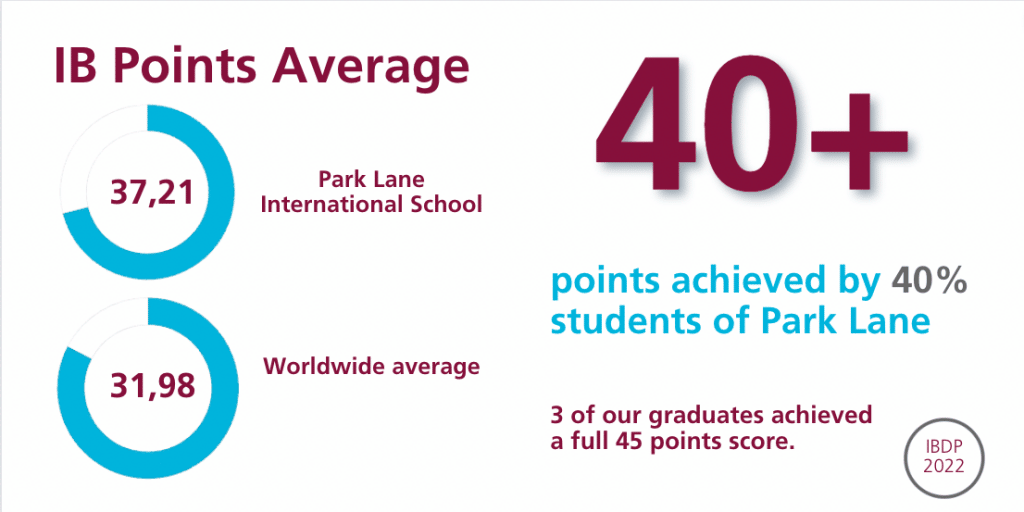
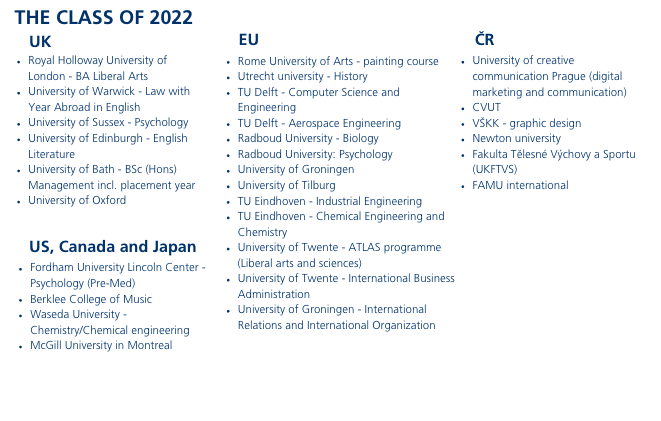
IB results and University destinations - 2021
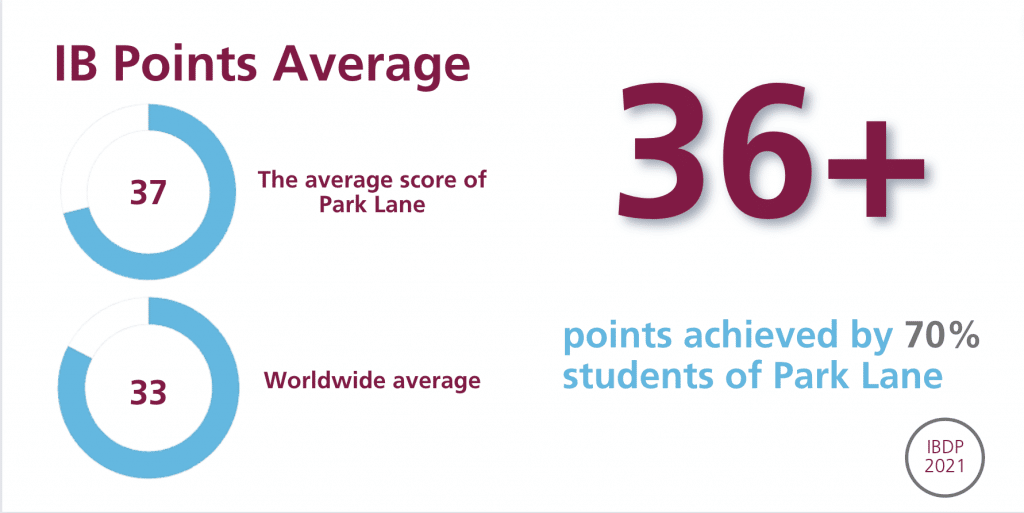

IB results and University destinations - 2020
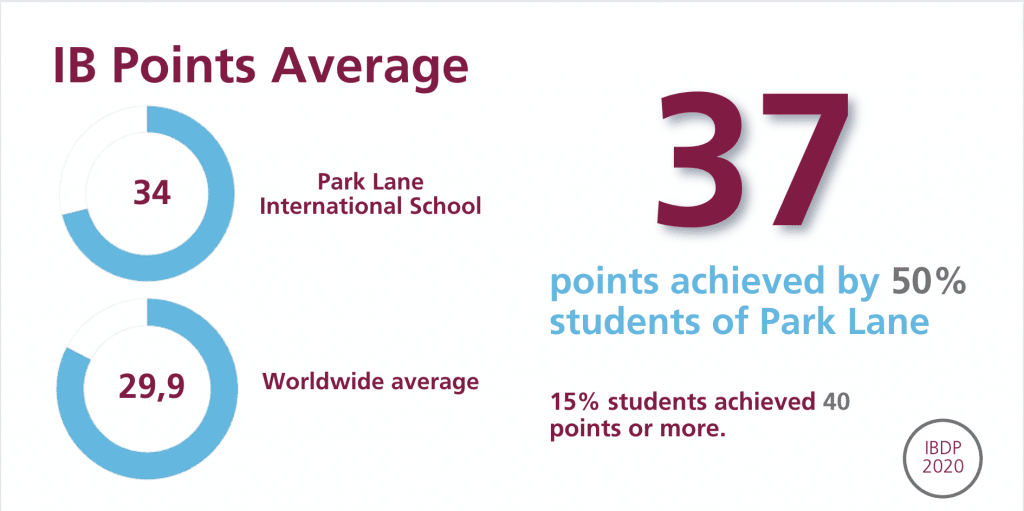
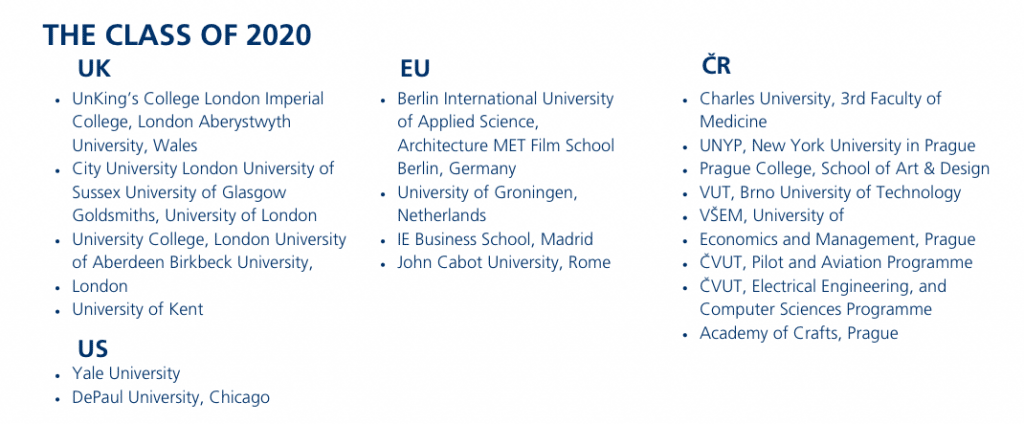
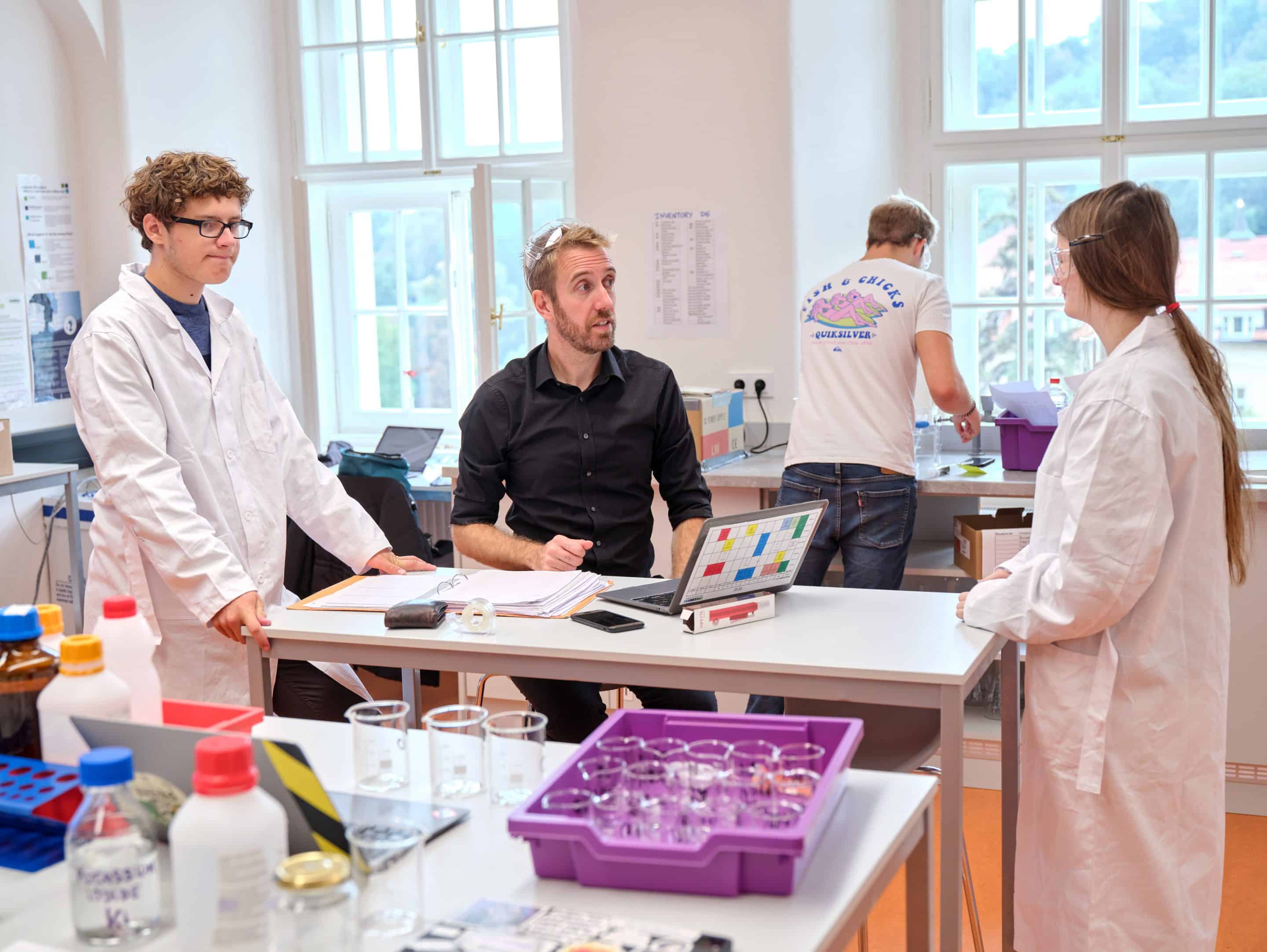
The IB Diploma Programme at Park Lane – How Are We Doing?
In 2024-25, Park Lane’s graduating Class of 2025 becomes the school’s sixth cohort of Year 12 students to begin the two-year IB Diploma Programme, moving up the hill from the Klárov branch to join our new Year 13 students at our bespoke IB Diploma centre in Úvoz street.
At Park Lane International School, all students advancing into Year 12 take on the challenges of the full IB Diploma Programme with no exceptions or alternative academic pathways – thus, by the time of their graduation in June 2025, this year’s IB newcomers will join more than 220 students to have completed the IBDP journey at Park Lane.
See our Principal’s full article here.
IB Diploma Programme Academics
Subject Choices
IB DP subject choices
At Park Lane students have a wide range of IB subjects on offer. For the IB DP course students choose 6 subjects, 3 of them on Standard level, 3 of them oh Higher level.
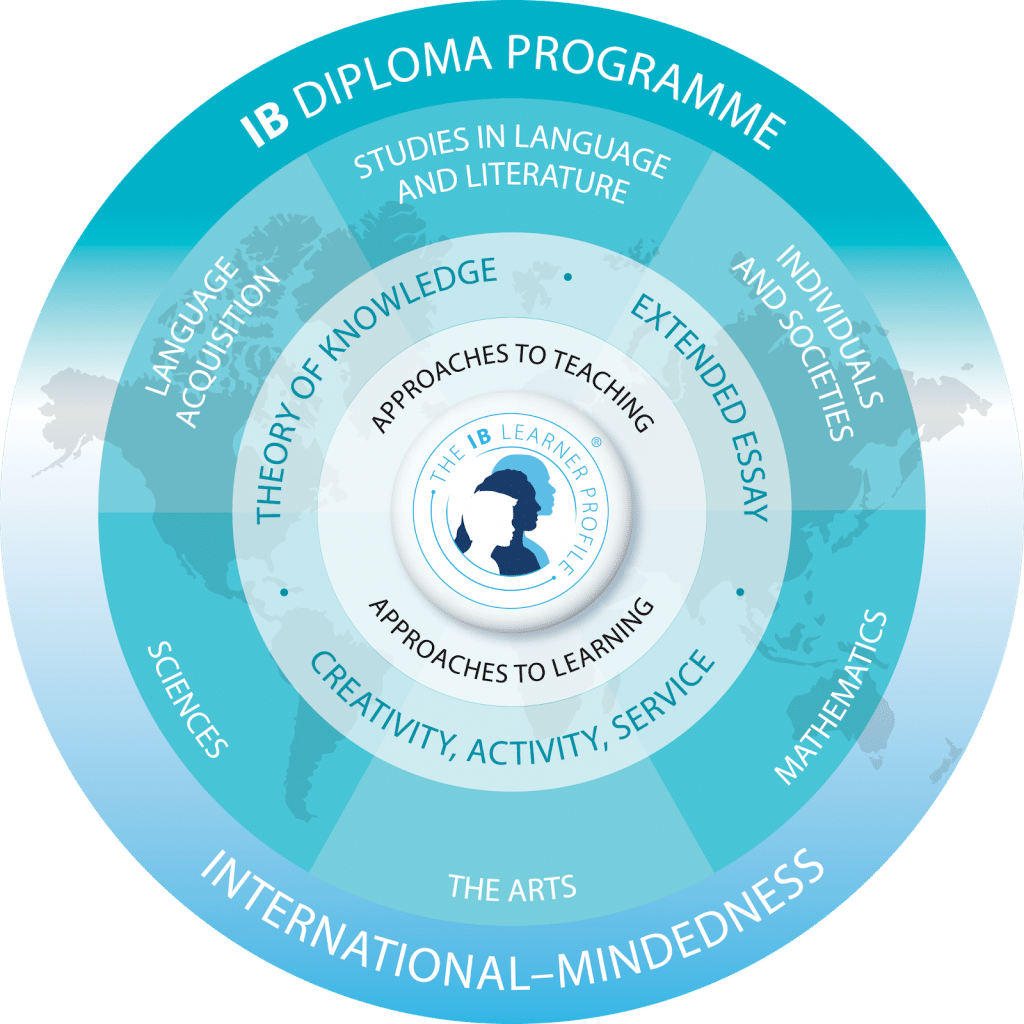
Studies in Language and Literature
Group 2
Language acquisition
Group 3
Individuals and societies
Group 4
Experimental Sciences
Group 5
Mathematics
Group 6
The Arts
When making choices students should consider:
- What would they like to study at university?
- University prerequisites
- Areas of individual interest and what they are good at
- The teachers‘ advice.
- The expected IGCSE reuslts (A*-B = HL subject, B-C = SL subject)
- For further information on expectations when joining the IB DP please refer to the Park Lane IB DP Admissions policy
Assessment and completion criteria
The International Baccalaureate® (IB) assesses student work as direct evidence of achievement against the stated goals of the Diploma Programme (DP) courses.
DP assessment procedures measure the extent to which students have mastered advanced academic skills in fulfilling these goals, for example:
- analysing and presenting information
- evaluating and constructing arguments
- solving problems creatively
Basic skills are also assessed, including:
- retaining knowledge
- understanding key concepts
- applying standard methods
In addition to academic skills, DP assessment encourages an international outlook and intercultural skills, wherever appropriate.
Student results are determined by performance against set standards, not by each student’s position in the overall rank order.
Student results are determined by performance against set standards, not by each student’s position in the overall rank order.
The IB uses both external and internal assessment in the DP.
External assessment
Examinations form the basis of the assessment for most courses. This is because of their high levels of objectivity and reliability. External assessment is provided by trained professionals in their subjects across the world.
They include:
- essays
- structured problems
- short-response questions
- data-response questions
- text-response questions
- case-study questions
- multiple-choice questions – though these are rarely used
Internal assessment
Teacher assessment is also used for most courses and is moderated by an external examiner to assure an unbiased assessment. The internal assessment includes:
- essays
- oral work in languages
- fieldwork in geography
- aboratory work in the sciences
- investigations in mathematics
- artistic performances
Completion criteria
- Students must study six subjects plus complete the Theory of Knowledge requirements, submit a passing EE and fulfill the requirement of the CAS programme. They must accumulate no fewer than 24 points from assessment in these subjects in addition to grade stipulations
- They must meet all of the additional requirements listed above
- They must do so within a maximum of three examination sessions
- Candidates who successfully meet these conditions will be awarded the diploma
- Candidates who take the diploma in multiple languages may be eligible for a bilingual diploma
The additional requirements are the following.
- CAS requirements have been met
- There is no “N” awarded for TOK, the EE or for a contributing subject
- There is no grade E awarded for TOK and/or the EE
- There is no grade 1 awarded in a subject/level
- There are no more than two grade 2s awarded (HL or SL)
- There are no more than three grade 3s or below awarded (HL or SL)
- The candidate has gained 12 points or more on HL subjects (for candidates who register for four HL subjects, the three highest grades count)
- The candidate has gained 9 points or more on SL subjects (candidates who register for two SL subjects must gain at least 5 points at SL)
- The candidate has not received a penalty for academic misconduct from the Final Award Committee
(Handbook of procedures 2017, section A1.2 Award of the IB diploma, available at occ.ibo.org)
Timescale of IB Diploma at Park Lane
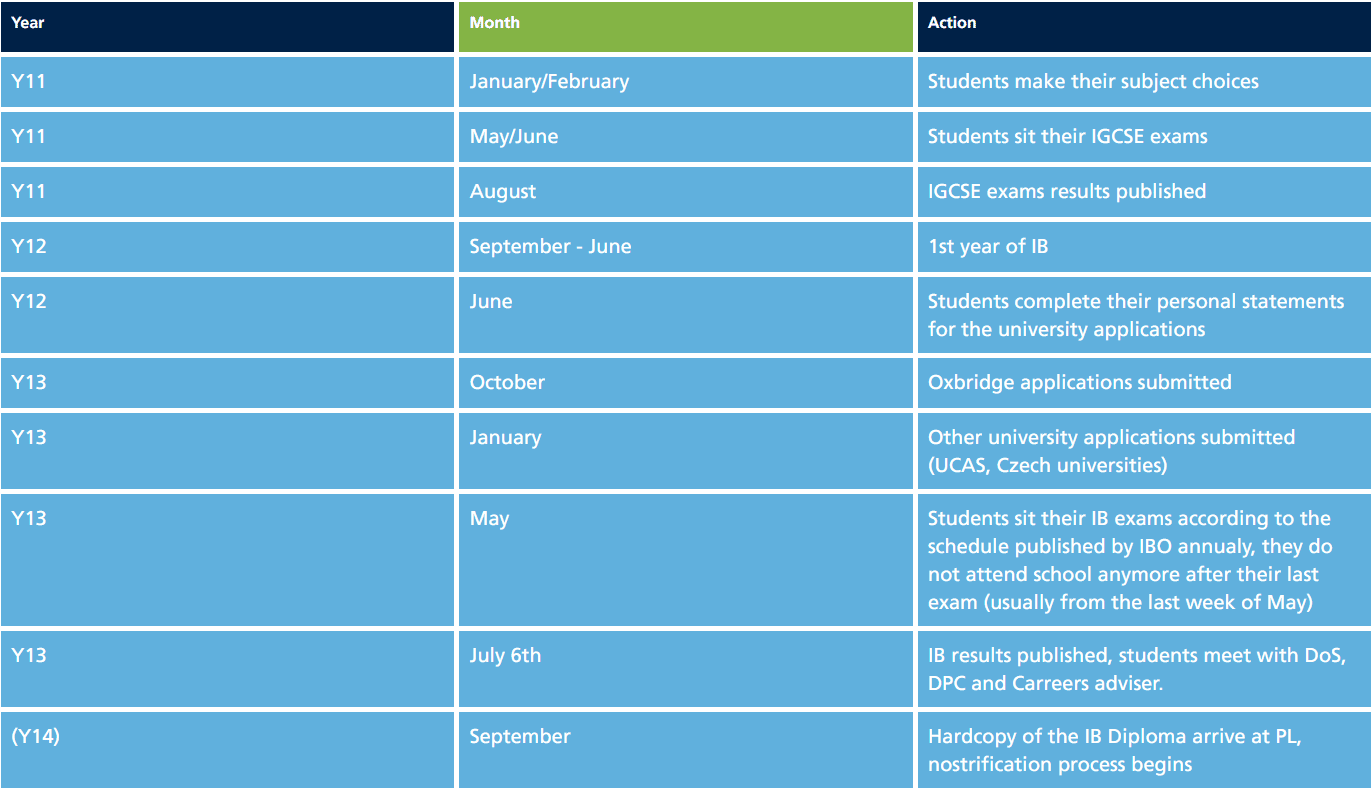

Studying the IB Diploma Programme
Students applying to study the IB Diploma Programme courses will have to demonstrate their academic ability and positive approach to learning. There is no guaranteed entry from the IGCSE Programme into the International Baccalaureate Diploma Programme (IBDP). All students wishing to study the IBDP are expected to provide evidence of their eligibility for the programme. In addition to IGCSE achievement, the Year 11 report may form part of the admission process.

IB Diploma Programme & Universities
Benefits for Students and Universities
Students at International Baccalaureate® (IB) World Schools are given a unique education.
They will:
- be encouraged to think independently and drive their own learning
- take part in programmes of education that can lead them to some of the highest ranking universities around the world
- become more culturally aware, through the development of a second language
- be able to engage with people in an increasingly globalized, rapidly changing world
IB students often perform better
Universities and colleges benefit from recruiting and admitting students from IB programmes in a range of ways, with IB programmes developing the knowledge, skills and disposition students need to be successful throughout their university careers.
As a result of their time in the IB, students develop:
- time management skills and a strong sense of self-motivation
- a keen interest in civic engagement
- notable academic ability
- strong research and writing skills
- critical thinking abilities
- an international outlook
Quality assurance in IB assessment
As an international programme with students all over the world, higher education institutions are always interested in how the IB safeguards the rigour and consistency of the Diploma Programme (DP), our programme for 16-19-year-olds.
The IB takes several measures to ensure validity and reliability of asessment methods, while measuring a great range of students’ skills and abilities – beyond just content knowledge. As a mark of its rigour, it is noteworthy that average scores and pass rates have remained consistent over several years.
The IB Learner profile
The International Baccalaureate® (IB) learner profile describes a broad range of human capacities and responsibilities that go beyond academic success.
They imply a commitment to help all members of the school community learn to respect themselves, others and the world around them.
The IB DP is committed to the development of students according to the IB learner profile. The profile aims to develop learners who are:
- Inquirers
- Knowledgeable
- Thinkers
- Communicators
- Principled
- Open-minded
- Caring
- Risk-takers
- Balanced
- Reflective
(adopted from www.ibo.org)

IB DP Admissions & Scholarship Programme
Admissions to IB Diploma Programme
Students applying to study the IB Diploma Programme courses will have to demonstrate their academic ability and positive approach to learning. There is no guaranteed entry from the IGCSE Programme into the International Baccalaureate Diploma Programme (IBDP). All students wishing to study the IBDP are expected to provide evidence of their eligibility for the programme. In addition to IGCSE achievement, the Year 11 report may form part of the admission process.
Further to the above, the following principles will apply:
- In order to enter the IBDP programme, Park Lane students are expected to have achieved A* to C grades in at least 8 subjects at IGCSE.
- In order to study a subject, which had previously been studied at IGCSE, at IB HL, it is expected that the student will achieve an A* to B grade (except for IB Maths HL, where an A or A* grade at IGCSE will be a prerequisite).
- To study a subject previously studied at IGCSE at IB SL, it is expected that the student will achieve at least a C grade.
- If a student decides to study new subjects, which they have not studied at IGCSE, entry to the course will be considered in relation to attainment in subjects that are naturally related: in order to choose Psychology at IB, a student’s results in English, Biology and Maths will be taken into consideration. Each student’s choice will be considered individually with the respective Subject Leader, and the DPC.
- External candidates for the IB diploma with no IGCSE results will sit entrance exams in English, Maths, non/verbal reasoning (and Czech in case of the Czech nationals). Reports from their previous previous school(s) will be considered. Viable candidates will be interviewed before acceptance.
The above considerations will apply during the process of the IB subject choices at the beginning of the 2nd term of Year 11. As IGCSE results are not available until mid-August, the most recent report grades/predicted grades (which are data based grades) will be used.
IB Diploma scholarship programme
The IB DP scholarship programme for academically-gifted secondary school students is offered to students wishing to join the IB Diploma Programme, which begins in Year 12 (16-17).
Description
- Applicants are chosen through a challenging selection process which tests English and mathematical ability as well as logic and reasoning skills, and the applicant’s personal capacity to benefit from Park Lane’s learner-centred pedagogy. The selection committee, led by the school principal, assesses each applicant’s school records for the last two years and conducts interviews with the candidate and his / her parents.
- All students wishing to join the IB Diploma Programme must provide evidence of their readiness to embark on this academically rigorous programme of study.
- Applicants are required to take entrance examinations (English, Mathematics and aptitude tests), must provide school reports for their studies and a motivation letter.
- Students who excel in the entry tests, and those who are able to demonstrate a strong record of success in their IGCSE, GCSE or equivalent in another school system, will be eligible for scholarships.
For further information please contact Mrs Karolína Schreiberová tel: +420 603 489 369 karolina.schreiberova@parklane-is.com

IB DP FAQ & What Parents Say
IB Diploma Programme FAQ
About IB
What is IB DP?
The International Baccalaureate Diploma Programme (IB DP) is a complex 2 year secondary school programme of study. Successful candidates obtain an IB Diploma which is a school leaving certificate recognised by universities worldwide.
What is the educational philosophy of the IB DP?
Students at IB DP not only gain knowledge from the excellent range and breadth of academic subjects they choose, but they also extend their skills in critical thinking, time management, develop an awareness of global issues and grasp the importance of being a lifelong learner. The IB DP curriculum expects students to become internationally minded and to care for the world they live in.
As part of their education, students complete the CAS programme (Creativity, Action and Service), which is at the heart of the IB DP. CAS encourages students to develop their creativity, physical endurance and social responsibility.
The philosophical concept of the IB is underpinned by the TOK component (Theory of Knowledge), which is omnipresent in each area of academic studies.
Last but not least, students will learn how to work at a very high academic level by writing an Extended Essay over the two years of study, which is excellent preparation for success at university.
Why IB at Park Lane?
We believe that the quality and strength of the programme is grounded in the holistic approach towards the education of young people today. As such, the programme represents the values we strive to support and develop in our students, in order to prepare them to become successful citizens in a changing world. Furthermore, the IB DP is a highly academically challenging programme, which opens doors to universities worldwide and is excellent preparation for further academic success.
How is the IB DP related to the MUN or DofE?
By participating in projects such as DofE or MUN, the student is not only able to develop and learn new skills, but participation in these activities aligns very well with IBDP in that both aspects develop leadership skills, encourage students to learn a new skill, promotes physical activity and inspires care for the community.
Participation in MUN or DofE is also beneficial to students when making university applications, as universities nowadays seek not only academically strong candidates, but also socially responsible, organised team players and leaders.
How does Park Lane support their students at IB DP?
There is a wide range of support mechanisms available from class teachers and subject leaders (who monitor the overall progress of students in their subjects), to the Key Stage coordinator (who supports students pastorally). Each student’s performance is monitored throughout the course and intervention procedures take place when needed, as described in each departmental handbook.
Additional support comes from the IB coordinator, Director of Studies, the Careers Adviser, and the IB also has mechanisms in place to provide support to schools.
When do students begin the IB Diploma Programme?
The IB DP at Park Lane starts in Year 12.
Can the IB DP be studied externally?
It is not possible to study the whole programme externally, however it is possible to take a Group 1 subject as a Self Taught subject. This means that a student attending an IB World school which does not offer his or her mother tongue in the range of Group 1 languages, can still study his/her mother tongue as part of the IB Diploma Programme under special circumstances. Details of such arrangements are individually set by the internal policies of each IB World school.
Do I need to sign my child up to a Czech secondary school in parallel with Park Lane, or after he or she finishes their compulsory education?
At the end of Y10, Czech students at Park Lane will have completed their compulsory education – there is no need to sign them up with a Czech secondary school. Students at Park Lane will have their compulsory secondary education covered by the IGCSE and IB programmes.
IB subjects and subject choices
How many subjects do students study at IB DP?
Students at Park Lane will choose 6 subjects, one from each of the following five groups:
- their best language
- additional language(s)
- the social sciences
- the experimental sciences
- mathematics
In addition, students must also choose either an arts subject from group 6, or a second subject from groups 1 to 5. Subjects can be taken at either higher level or standard level.
Apart from the academic side of the programme, students will be required to complete the Core curriculum, which includes writing an extended essay, studying the Theory of Knowledge course and completing the CAS requirements (Creativity, Action and Service).
When do students choose their subjects?
Students will choose their subjects in the middle of Y11. Subject choices, related procedures and more details about the IBDP will be presented and explained in detail to parents and students at the Subject Choices evening in Y11. Each student will have an opportunity to discuss his or her subject choices individually with the IBDP coordinator, Director of Studies, Key Stage 4 coordinator and the Careers adviser.
When should you start thinking about IB DP?
It may be a good idea to start thinking about the IB Diploma prior to the IGCSE subject choices, as some subjects at IGCSE may be a prerequisite for entry into the subject at IB. However, in cases where the subject doesn’t exist at IGCSE but is offered in IB, the individual student’s overall achievement at IGCSE will be considered and the IB DP coordinator, Careers adviser, Director of Studies and the KS4 coordinator will offer further guidance.
Remember though that the two year IB programme is an independent course of study and as such it should not be seen as a continuum to the IGCSE programme only. Therefore students are relatively free to choose their subjects according to their needs.
What is the Literature A: Czech subject?
It is a demanding course based on 13 works of Czech and world literature. Students explore various works from many different angles and learn how to analyse and interpret texts in general. They explore literary features used in texts and compose analytical essays and oral presentations on various topics. The course develops skills in critical thinking and analysis, social adeptness and communication and develops their appreciation of a writer’s choices. Classroom teaching methods emphasise teamwork and collaboration whilst empowering students to be independent learners.
If I want to know more, who shall I speak to?
The first point of contact regarding anything relating to IB, is the IB DP Coordinator, Mr. Jan Čihák. Please contact him at jan.cihak@parklane-is.com.
IB and Assessment
How is IB assessed?
Students will complete internal assessments throughout the entire course of study. They will sit various oral exams in the languages subjects, as well as complete field studies and assessed projects in the sciences and humanities faculties. In May of their second year of IB, students will sit written exams in all subjects as part of their external assessment. This exam period lasts for about three weeks and papers are externally marked by qualified IB examiners. Some pieces of work done internally over a longer period of time (e.g. the Experiment study in Psychology) will be teacher assessed but moderated by an external IB examiner.
What if I fail the IB DP exams, can I repeat?
If for some reason a student fails their Diploma, they may re-sit the exam on the component that was failed, in November of the same year or in the following May. Another option is to request a re-mark from the exam board.
Will the Czech students sit both IB exams and Maturita?
Students at Park Lane with Czech citizenship will not sit the Maturita but must take the Literature A: Czech, Higher level exam as one of their IB subjects.
IB DP and Universities
What are the opportunities for IB DP graduates when making applications to universities abroad?
IB Diploma Programme is a secondary school leaving certificate recognised and respected by universities worldwide. Students with an IB Diploma are likely to enroll in top universities across the globe.
How can I make sure that my portfolio of IB DP subjects caters (mostly) to my university aspirations?
Subject choices will be partially influenced by the intended field of study at university. It is not entirely necessary to be 100% sure about your future studies before you start the IB DP course, however it’s good to have a rough idea of what you want to study at University so that the combination of subjects chosen for IB reflects your future intentions. Therefore, select subjects at IB carefully and with consideration for your future goals and intended field of study at university. Some universities and some areas of study expect a certain combination of IB DP subjects or a certain minimum achievement of points in selected subjects (and overall). This is a very individual issue which should be discussed during the subject choices process and in conjunction with the Careers adviser and IB coordinator.
Do the Czech universities accept the IB Diploma Programme? Is it possible to pursue studies at universities in the Czech Republic without Maturita?
In order to apply to the Czech universities students will need to present a certificate of completed secondary education, which the IB Diploma Programme fulfils. At the moment successful applications depend on the university and the field of study – universities may require a “nostrification” (validation of the IB Diploma for the Czech Republic) or they may accept students without such validation.
Detailed information about nostrification can be found here:
http://www.msmt.cz/vzdelavani/skolstvi-v-cr/nostrifikace-uznani-zahranicniho-zakladniho-stredniho-a
The IGCSE Program
Why do we need the IGCSE exams, isn’t the IB Diploma Programme enough?
Many successful IB schools use Cambridge IGCSE exams as a standardised measure of student achievement at the end of Year 11. This standardised assessment helps Park Lane ascertain student ability in order to ensure that they are able to meet the demands of their intended path through the IBDP. For example, if a student does not achieve a very high grade in IGCSE mathematics, the school would suggest they do not attempt to study Higher Level mathematics at IB DP.
How many subjects do students choose for the IGCSE exams and how does the IGCSE work?
At Park Lane the core IGCSE curriculum comprises 6 subjects: English Language and English Literature, Biology, Chemistry, Physics and Mathematics. Students then choose 4 subjects from our option blocks. The option blocks are created with the needs of the individual cohort in mind, and after considering any curriculum changes in the Cambridge International Examinations or in the IB. In exceptional circumstances, it is sometimes possible for a student to take on an additional IGCSE through our ECA programme. For example, in November 2017, three of our very able students studying French will complete the French IGCSE, having studied the extra content through an ECA.
Can I decide for my child not to sit the IGCSE exams?
No. The Key Stage 4 curriculum at Park Lane is based on the Cambridge IGCSE. A student’s IGCSE results will form the basis of the entry requirements into the IB Diploma and will inform those subject choices. Therefore, not sitting the IGCSE examinations may limit a student’s Diploma pathway.
I want to know more about IGCSE, who should I speak to?
Our Subject Leaders are able to provide an overview of each course and answer subject-specific questions. The Director of Studies will be able to answer general questions related to the Options process and the curriculum in general.
What parents ask about IB Diploma
Interview
IB at Park Lane International School
Mr. Paul Ingarfield, School director
Mr. Jan Čihák, IB coordinator
Mrs. Markéta Fantová, Parent (interviewer)
Q: Why did you decide to choose the IB Diploma programme as the programme of study for the graduates at PL?
As an international school settled in the heart of the cosmopolitan city of Prague we were looking for a programme, which supports international mindedness, promotes appreciation of cultural diversity and fosters the collaborative nature of learning at the same time. The International Baccalaureate Organisation and the Diploma Programme represent a progressive, 21st century oriented pedagogical philosophy and the DP graduates are welcome by the most prestigious universities worldwide since 1960’s. The universities appreciate mostly the skills of the 21st century learner which the graduates from the IB DP definitely posses.
One of the aspects of the IB DP we highly value among other is its flexibility in terms of the subject students may choose from to study and also the focus on the individual development of each student’s skills. The IB DP goes largely beyond the academic achievements focusing on a holistic development of each student via the Creativity – Activity – Service core component of the DP (physical activities chosen by students contributing to healthy lifestyle, voluntary service to the community, such as helping people in need and creative activities which could be for example learning to play a musical instrument or organization of a photography exhibition).
Q: What is the added value that Park Lane brings in to the IB DP teaching and learning?
Since the beginning of the existence of Park Lane we have always approached each student individually providing support precisely tailored to the actual students’ needs. We carefully identify each student’s strengths and weaknesses in order to offer the best-fit approach to maximise his or her learning and achievements. Our learning groups are small and enable a more personalized, student-centered approach from the teachers. Last but not least we offer a significantly large variety of DP subjects to choose from given the relatively familial nature of our school.
We are aiming at satisfying each student’s individual choice without compromises. The IB DP subject choices are a long process and are done carefully in close student’s cooperation with the DP Coordinator, the Careers adviser and the parents.
Q: What are the Park Lane targets for the IB DP exam results?
It is very difficult to predict the individual results our students will achieve in 2 years time. However, we are aiming at such scores where not a single Park Lane DP graduate will score below the world average which oscillates around 29 – 30 points every year – we are quite confident we can achieve this. We will carefully consider student entries to the secondary school (Y6 transition to Y7), we will use strategies to identify areas of support to students, especially in Y9 and Y11 (end of Key Stage 3 and 4).
Moving up to the Key stage 5 will not be an automatic process and there are already measures in place to secure as much as possible that students entering the DP programme will succeed at the end. Each existing and new Park Lane student entering the IB DP will be provided with individual advice on subject choices especially in relation to the future university studies by the IB DP Coordinator and the Careers and Universities Adviser.
Again, we would like to stress here that individual support to each of our student is our undoubted and self-evident prerequisite for success.
Q: And what about students who wish to join Park Lane just for the IB DP?
Students joining us from the outside at different key stages will be expected to demonstrate above average academic abilities and solid motivation in order to pursue their studies at Park Lane. This is of course also a principle we will apply to students joining us for the IB DP – by the way we welcome students from the outside also because they enrich our existing community as well as our existing community enriches them in a variety of ways.
These students will sit entrance exams usually in English, Mathematics and Czech (if they opt for the bilingual diploma). Part of the entrance procedures is also a standardized test measuring the applicant’s suitability for the rigorous studies at IB DP and a face to face interview with the Principal and the IB DP coordinator.
Q: What are the Park Lane aims in terms of the university destinations of the graduates?
This will very much depend on each student’s individual future plans and career options that every graduate will pursue. Our ambitious aim is to see 30% of our graduates to pursue their studies at prestigious universities such as Oxford, Cambridge, LSE to name the British ones; Harvard, Stanford in the USA and many other non-UK prestigious schools including the most prestigious Czech universities, such as the Charles University.
We would also like to secure at least 70% of our graduates to reach their first-choice university and course.
Q: How do you want to achieve this?
Again, as stated above, we want to maintain and further develop our high standards of individualized information and guidance provided to students and parents to work together on our target. A well trained and experienced Universities and Career Support adviser is available for each student to provide guidance and individual support in the area of careers and further education choices.
The process of subject choices for the IGCSE and IB is also well supported by the relevant members of staff (Director of Studies, Careers Adviser, IB DP Coordinator, subject leaders) who meet with students, inform parents at various related forums organized after school.
We are very keen on starting the careers orientation very soon, so already in KS3 students start to think about their future and they also learn about how Park Lane can (and will) guide them throughout the whole process.
We also work with the most up to date online sources, the software supporting students’ universities choices is already in place and used by students themselves, starting at Key Stage 4 already (Fast Tomato, Bridge U).